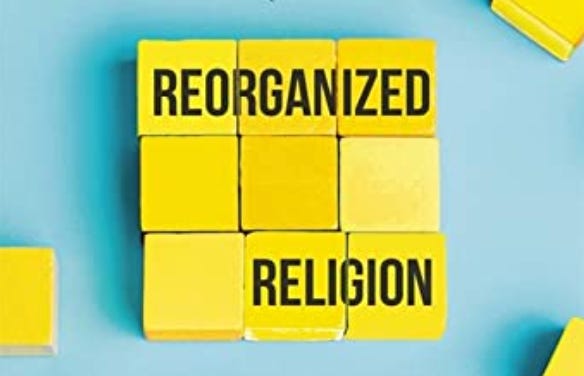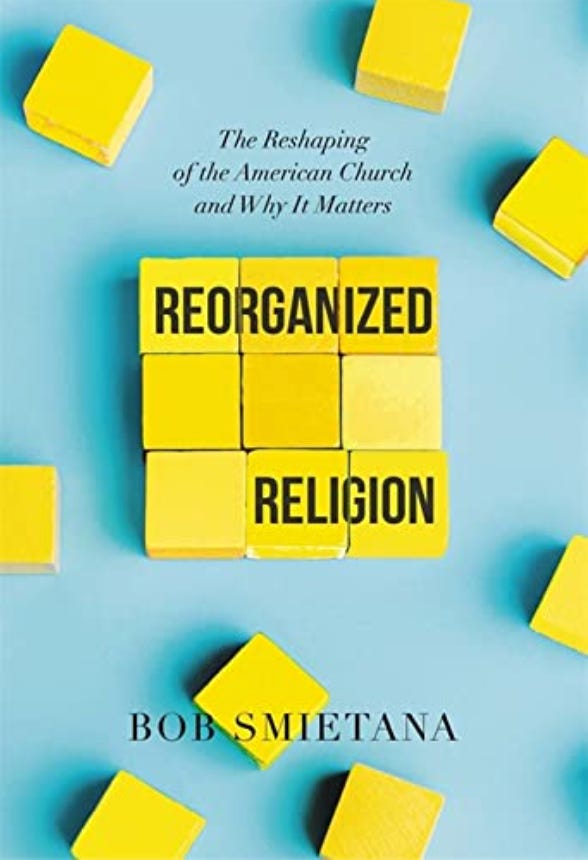One of the tensions in church leadership these days is the challenge to care for two sides of a problem. Bob Smietana, in Reorganized Religion: The Reshaping of the American Church and Why It Matters, tells a few stories of how some people came forward. A common pattern arises: those in charge care for the church, for its pastors, for its reputation but often fail in caring for the very person that brought forth, say, some concerns.
The concerns that arise in Bob’s chapter are more along the line of the exvangelical folks.
Chrissy Stroop, known for a book about emptying the pews because the church does more harm than good, anchors some of the story in the alignment of politics with the church. Do any of these politically conservative-aligned church people know what form of politics one finds in Europe? That the majority of European evangelicals are to the left of the Democratic party in the USA? (I could mention also South America or Africa or S. Korea.)
Anyway, I digress.
In the USA, and here we return to Stroop’s story, many students are prepared in Christian schooling and church life to enter the culture wars, to enter into the purity culture, and to denounce evolutionary sciences.
And all along there is what Bob quotes as “apocalyptic power-grabbing” – that is, they are nurtured into “mega-identities” with very hard boundaries. One’s faith, one’s politics, one’s economics, one’s race, one’s ethnicity, one’s gender, one’s neighborhood – pile on top of one another to form a single group identity. To be in all issues is to be in, to be out on any issue is to be out. So true for so many. It’s all or nothing, zero-sum game.
In many of the experiences I have read, people find their past history so painful or traumatic they can no longer participate in a church or even the faith. We have failed many such persons by not listening well enough and not tolerating questions well enough. Many of the young church leaders have become adepts at listening and learning from those who are deconstructing and disentangling themselves from their past. I know I have learned much from my students at Northern who minister to the Nones and Dones.
The Dones, I read recently, never quite give up their former faith. Once a fundamentalist, once an evangelical, once a Catholic, once an evangelist, always a fundamentalist, an evangelical, a Catholic, an evangelist. That religious fervor that marked a person’s earlier life imprints them to have such a fervor in their post-former-group identity.
He also tells some of the story of Kara Million, whose story has gone viral on Twitter. PCA. Evolutionary biologist. Her church broke her heart. The pastor was reported, the PCA authorities did not protect confidentiality, and he then sued her for smearing his reputation. She’s in no-man’s land over the church.
Then there’s the SBC’s pastor sexual abuse cases and the SBC’s history of protecting pastors and churches and the SBC at the expense of whistleblowers. Here is where the SBC failed those who had been abused. They have been systemically ignored. The whistleblowers systemically are labeled and Bob refers to Augie Boto who labels the whistleblowers as being in line with the evil one – the ultimate labeling act by many church leaders. Preserving the base has been the language of Ronnie Floyd.
Local churches and denominations need to have practices established that secure care for both the whistleblowers and the ones accused. The tendencies have always been to care for the pastors and those in power, and rarely for the victims. Both make up proper church care.
Does your church have any policy in place? May I suggest that churches develop a practice of caring for victims first, and only then a practice to care for those in power. Not one or the other, but both.






As the husband of a PCA women’s ministry director who was fired for blowing the whistle, thank you for this. The way the senior pastor has been and continues to be protected at the cost of my wife and our family has been unimaginably hurtful. One elder even said “my job is to protect my pastor.” A shepherd saying his job is to protect another shepherd rather than the sheep. At least he was honest and actually said it out loud so as to remove any doubt where his priorities lay.
Thanks for creating a space to have these discussions. I know Darkness to Light has a great program with important safeguards to prevent child sex abuse in churches. Also your book, A Church Called Tov is a practical tool for pastors. I think it's important to maintain order in the church. The Peacemaker is a great book about resolving conflict in general, but it's great for churches who need a system for handling grievances in general. I am not a pastor but I have tried to be a positive force within the church so I've read a lot of these types of books. At this point, I am just doing my best to be a light through my blog, within my family and with the people I meet day to day. And I am really enjoying studying the Bible for myself too - so far, that gives me the sense of order I need.